Note: Yale School of the Environment (YSE) was formerly known as the Yale School of Forestry & Environmental Studies (F&ES). News articles and events posted prior to July 1, 2020 refer to the School's name at that time.

In 2006, the Yale School of Forestry & Environmental Studies and the Yale School of Management launched the Yale Center for Business and the Environment (CBEY), an innovative center that has inspired research and fostered relationships to advance business solutions to the world’s environmental challenges.
Over the past decade, CBEY has become a valuable platform for building and growing relationships among students, faculty, alumni, corporate executives, policymakers, and NGOs. Through interdisciplinary courses and initiatives, research, and outreach, CBEY has equipped a growing network of leaders with the skills and collaborative opportunities to create innovative and sustainable solutions to challenges facing the human and natural systems upon which we all rely.
To mark CBEY’s 10th anniversary, we asked several of the center’s most esteemed alums to reflect on how CBEY prepared them to address those challenges and where those lessons have led them.
Over the past decade, CBEY has become a valuable platform for building and growing relationships among students, faculty, alumni, corporate executives, policymakers, and NGOs. Through interdisciplinary courses and initiatives, research, and outreach, CBEY has equipped a growing network of leaders with the skills and collaborative opportunities to create innovative and sustainable solutions to challenges facing the human and natural systems upon which we all rely.
To mark CBEY’s 10th anniversary, we asked several of the center’s most esteemed alums to reflect on how CBEY prepared them to address those challenges and where those lessons have led them.
Bryan Garcia ’00 M.E.M.
President & CEO, Connecticut Green Bank; First CBEY Director
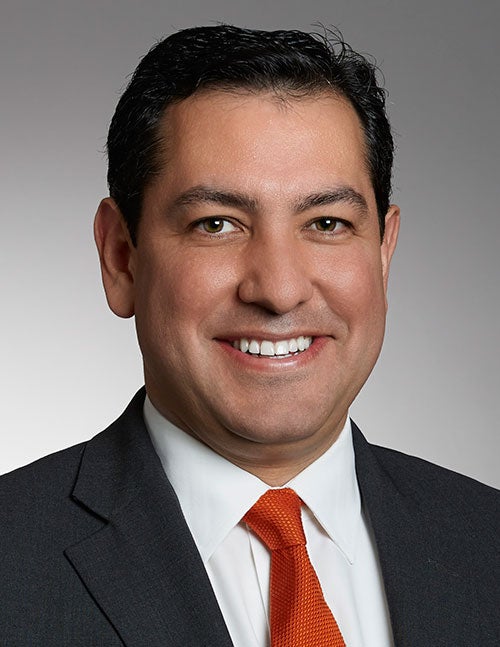
“As Professor William Goetzmann noted, ‘financial markets have incredible potential for implementing change…[and] are at least worth a gamble in terms of being a tool that we might be able to use to solve environmental problems.’ The joint-degree program, administered by the Yale Center for Business and the Environment through Yale F&ES and Yale SOM, is creating ‘green bankers’ to do just that — solve the problem of global climate change through the lens of financial innovation. The Connecticut Green Bank, the nation’s first state-level green bank, has hired a number of joint degree students who are incredibly prepared to lead a movement to make clean energy more accessible and affordable by using limited public funds to attract and deploy private capital investment in the clean energy economy.
“Take, for example, Chris Magalhaes [’14 M.E.M./M.B.A.], a recent joint-degree alumnus who had the choice of managing investments in the family office of one of the world’s top hedge funds, or take a job with the Connecticut Green Bank. Within six months after joining the Connecticut Green Bank, this ‘green banker’ was part of a team that closed a $100 million deal with a private capital partner to finance clean energy improvements across commercial, industrial, nonprofit, and multifamily properties that lower their energy costs, reduce greenhouse gas emissions, and create jobs. As Chris would say, ‘structuring the deal, and continuing to underwrite and place new projects into the program, has been a complex, educational, and innovative boon to society.’
“Congratulations CBEY on your 10th Anniversary… and keep on preparing environmental leaders for business and society!”
“Take, for example, Chris Magalhaes [’14 M.E.M./M.B.A.], a recent joint-degree alumnus who had the choice of managing investments in the family office of one of the world’s top hedge funds, or take a job with the Connecticut Green Bank. Within six months after joining the Connecticut Green Bank, this ‘green banker’ was part of a team that closed a $100 million deal with a private capital partner to finance clean energy improvements across commercial, industrial, nonprofit, and multifamily properties that lower their energy costs, reduce greenhouse gas emissions, and create jobs. As Chris would say, ‘structuring the deal, and continuing to underwrite and place new projects into the program, has been a complex, educational, and innovative boon to society.’
“Congratulations CBEY on your 10th Anniversary… and keep on preparing environmental leaders for business and society!”
Charlotte Kaiser ’07 M.E.Sc./M.B.A.
Deputy Managing Director at NatureVest
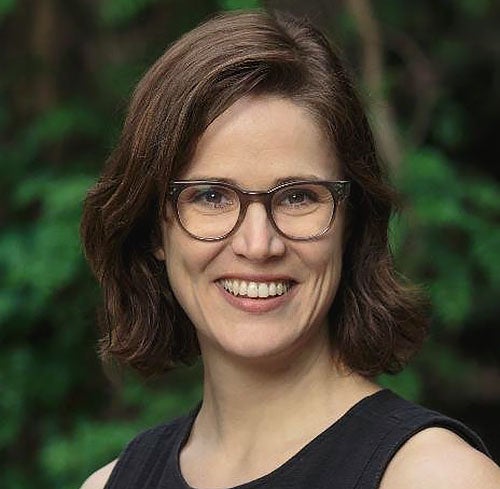
“There was no ‘impact investing in conservation’ job in 2007 when I graduated. When I came to the joint degree, I was really interested in nonprofit management and using business practices to improve nonprofit performance. And I was really interested in watershed management and I thought that that’s what I was going to do — be a really good watershed manager with business skills.
“But that’s not at where I ended up. The world changed around us. I also got really interested in finance and investing in environmental markets. Robert Repetto created an environmental science class in which we tried to value the environmental risk of a publicly traded company. This was early in the whole climate-risk-assessment-for-investor stuff. Back then everybody was very skeptical, and it’s fascinating to see how much the markets have moved toward sustainable investing in the intervening decade. But what was great for me was the willingness of the faculty to participate in this changing world with the rest of us students.
“I was there also when we built CBEY, and Brad Gentry and Dan Esty were super-engaged and supportive of allocating resources there. Brad’s Emerging Markets for Ecosystem Services class really woke me up to the kinds of things that I wanted to be doing once the puck actually got to that end of the rink. It was totally not there yet when I graduated. But I figured maybe it would be eventually, and it seems to have arrived...
“I think there were eight or nine joint degrees [students] starting out my first year. It was the biggest year ever and it felt like we were on the cusp of growth. Things were starting to happen, but it was still a totally different world from the one we (now) live in. When we would say ‘business and the environment,’ people stared at you like: ‘What is that, renewable energy?’ ... And then the next year there were 10 or 12 prospective [joint degree] students; all but two went to Michigan. And the reason is that at the time, the University of Michigan offered a full ride for the third year. We had no merit aid at F&ES, and some at SOM, and nothing for the joint degree. I think it was [former F&ES Dean, Gus Speth’s second to last year and it was [former SOM Dean] Joel Podolny’s first year.
“So we pushed really hard on the joint degree as a strong selling point. We told Dean Podolny, ‘We really think the joint degree with the Forestry School is a way to sell SOM as a school about leadership for business and society.’ And that was kind of the pitch. Podolny and Speth came together and committed resources to launch the Center. The deans put Dan Esty and Brad Gentry in charge, and they formed a search committee that included students and we hired a director [Bryan Garcia]. What we did was to really highlight for the administration the values and assets in the program. And I think that’s what led to the investment that’s been made. And you know it’s proven out. It is growing and it’s generating its own revenues, and it’s awesome.”
“But that’s not at where I ended up. The world changed around us. I also got really interested in finance and investing in environmental markets. Robert Repetto created an environmental science class in which we tried to value the environmental risk of a publicly traded company. This was early in the whole climate-risk-assessment-for-investor stuff. Back then everybody was very skeptical, and it’s fascinating to see how much the markets have moved toward sustainable investing in the intervening decade. But what was great for me was the willingness of the faculty to participate in this changing world with the rest of us students.
“I was there also when we built CBEY, and Brad Gentry and Dan Esty were super-engaged and supportive of allocating resources there. Brad’s Emerging Markets for Ecosystem Services class really woke me up to the kinds of things that I wanted to be doing once the puck actually got to that end of the rink. It was totally not there yet when I graduated. But I figured maybe it would be eventually, and it seems to have arrived...
“I think there were eight or nine joint degrees [students] starting out my first year. It was the biggest year ever and it felt like we were on the cusp of growth. Things were starting to happen, but it was still a totally different world from the one we (now) live in. When we would say ‘business and the environment,’ people stared at you like: ‘What is that, renewable energy?’ ... And then the next year there were 10 or 12 prospective [joint degree] students; all but two went to Michigan. And the reason is that at the time, the University of Michigan offered a full ride for the third year. We had no merit aid at F&ES, and some at SOM, and nothing for the joint degree. I think it was [former F&ES Dean, Gus Speth’s second to last year and it was [former SOM Dean] Joel Podolny’s first year.
“So we pushed really hard on the joint degree as a strong selling point. We told Dean Podolny, ‘We really think the joint degree with the Forestry School is a way to sell SOM as a school about leadership for business and society.’ And that was kind of the pitch. Podolny and Speth came together and committed resources to launch the Center. The deans put Dan Esty and Brad Gentry in charge, and they formed a search committee that included students and we hired a director [Bryan Garcia]. What we did was to really highlight for the administration the values and assets in the program. And I think that’s what led to the investment that’s been made. And you know it’s proven out. It is growing and it’s generating its own revenues, and it’s awesome.”
Sumit Kadakia ’16 M.F./M.B.A.
Co-founder of Renewal Mill
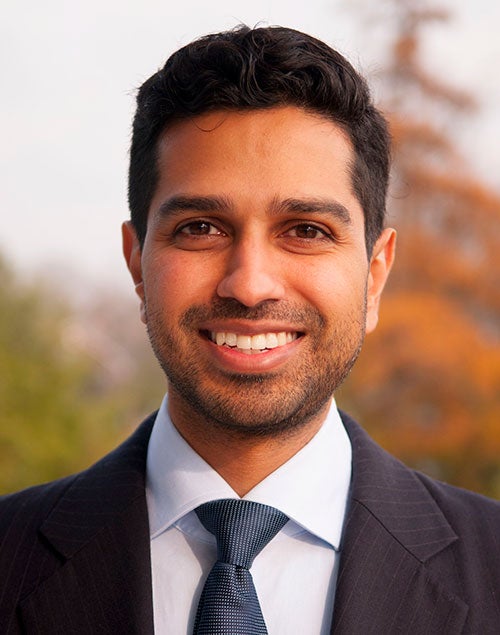
“As a 2016 graduate, it’s not difficult to recognize how large of an impact CBEY has had on my current work and future career path. CBEY has helped me answer ‘why,’ ‘for whom,’ and ‘by what means’ I should work in order to make an environmental impact.
“First, the why: Earlier in my forestry education, I recognized that there were significant problems with diversity in the environmental workforce. CBEY empowered me to find relevant minority success stories and bring them to campus through the ‘Bright Lights, Green Sights” speaker series. Through this experience, I hope to continue to be a leader for inclusivity in environmentalism.
“Next, the for whom: I easily spent over 100 hours speaking to contacts introduced to me through CBEY during my time in graduate school. These connections with alumni helped me form a strong network and better understand who I want to work with in the future.
“Finally, the by what means: I have always been entrepreneurially minded, but never took the first step to start a venture. I was determined to change this at Yale and the Center helped me through each step — past the first two failures and onto my third (hopefully successful!) venture. The financial and non-financial support provided by CBEY made my goal a reality.
“Moving forward: Over the next 10 years, I wish for the Center to continue to focus on finding new ways to empower students while continuing old traditions like the CBEY pitch competition. I also am excited for the Center to tackle more global business and environmental issues and create solutions that can drive change for underserved populations. Finally, I look forward to CBEY continuing to deepen its relationships with New Haven businesses and communities and understand how students can help make New Haven a healthier, more sustainable community.”
“First, the why: Earlier in my forestry education, I recognized that there were significant problems with diversity in the environmental workforce. CBEY empowered me to find relevant minority success stories and bring them to campus through the ‘Bright Lights, Green Sights” speaker series. Through this experience, I hope to continue to be a leader for inclusivity in environmentalism.
“Next, the for whom: I easily spent over 100 hours speaking to contacts introduced to me through CBEY during my time in graduate school. These connections with alumni helped me form a strong network and better understand who I want to work with in the future.
“Finally, the by what means: I have always been entrepreneurially minded, but never took the first step to start a venture. I was determined to change this at Yale and the Center helped me through each step — past the first two failures and onto my third (hopefully successful!) venture. The financial and non-financial support provided by CBEY made my goal a reality.
“Moving forward: Over the next 10 years, I wish for the Center to continue to focus on finding new ways to empower students while continuing old traditions like the CBEY pitch competition. I also am excited for the Center to tackle more global business and environmental issues and create solutions that can drive change for underserved populations. Finally, I look forward to CBEY continuing to deepen its relationships with New Haven businesses and communities and understand how students can help make New Haven a healthier, more sustainable community.”
Marissa Galizia ’15 M.E.M./M.B.A.
ChargePoint, Inc., Strategic Partnerships
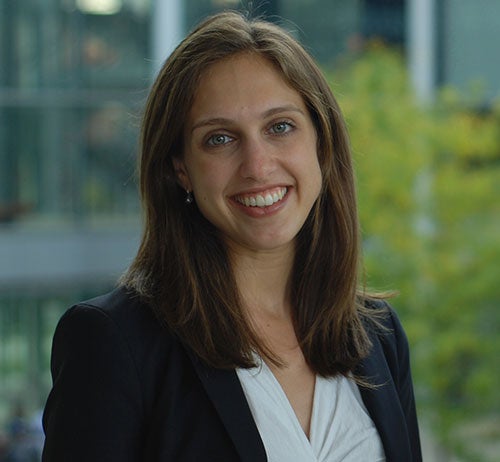
“My goal for my three years as an MBA/MEM joint degree at Yale was to learn how to accelerate the adoption of clean energy technologies through strategic marketing. Though there wasn’t yet programming on the intersection of marketing and sustainability, the Center for Business and the Environment at Yale helped me find and create the experiences I needed to explore this and begin a career in it. The Center supported me in developing a new speaker series: The Colloquium on Sustainability Marketing. Through working with speakers from a variety of different fields, I learned best practices and common pitfalls and developed a network of peers, alumni and industry contacts with similar interests. I gained insight into where the opportunities and challenges were, which helped guide my career search.
“The Center for Business and the Environment also helped connect me with entrepreneurship, research and consulting opportunities to gain hands-on experience in the field. As a recipient of a Sobotka grant I helped develop the marketing plan for an energy efficiency business concept, as a Solar Energy Evolution & Diffusion Studies (SEEDS) research assistant I studied solar marketing strategies, and as a consultant to the Coalition for Green Capital I co-wrote and published recommendations for financing electric vehicle adoption. All of these experiences have culminated in my current role, Strategic Automotive Marketing Manager at ChargePoint, the largest electric vehicle-charging network. In this role I’m using marketing to enable EV sales and EV charging deployment nation-wide.
“I think CBEY’s strength is its ability to provide a breadth of programs and resources that students can use to create momentum for their areas of interest. In the next ten years I think transportation sustainability is going to be an area of tremendous innovation and growth and one that could benefit from increased attention from business and environment students at Yale.”
“The Center for Business and the Environment also helped connect me with entrepreneurship, research and consulting opportunities to gain hands-on experience in the field. As a recipient of a Sobotka grant I helped develop the marketing plan for an energy efficiency business concept, as a Solar Energy Evolution & Diffusion Studies (SEEDS) research assistant I studied solar marketing strategies, and as a consultant to the Coalition for Green Capital I co-wrote and published recommendations for financing electric vehicle adoption. All of these experiences have culminated in my current role, Strategic Automotive Marketing Manager at ChargePoint, the largest electric vehicle-charging network. In this role I’m using marketing to enable EV sales and EV charging deployment nation-wide.
“I think CBEY’s strength is its ability to provide a breadth of programs and resources that students can use to create momentum for their areas of interest. In the next ten years I think transportation sustainability is going to be an area of tremendous innovation and growth and one that could benefit from increased attention from business and environment students at Yale.”
Anastasia O’Rourke ’09 Ph.D.
Industrial Economics, Sustainable Purchasing Leadership Council
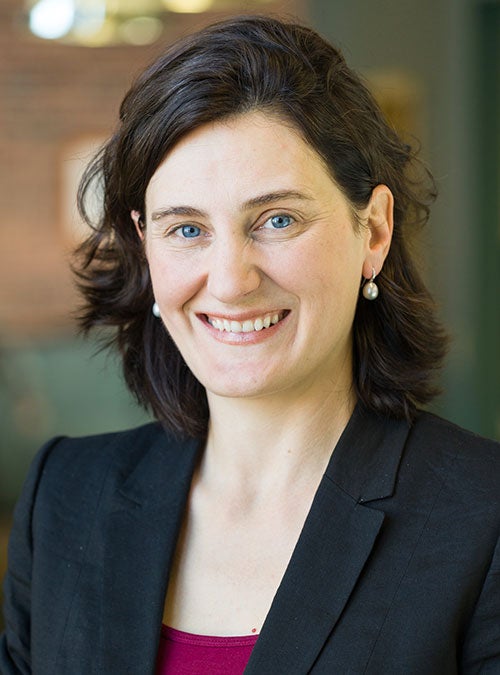
“As an active member of both F&ES & SOM communities while at Yale, I took full advantage of the opportunities available to me. An aspiring entrepreneur, I helped to build some of CBEY’s programs in entrepreneurship — most notably the Sabin Venture Prize, which has encouraged and enabled many Yale students to follow an entrepreneurial path. During my years at Yale, I also proposed and launched the inaugural business plan class at F&ES with McClusky Fellow John Forgach, SOM professors David Cromwell and Maureen Burke. I was fortunate to work with advisors Dan Esty, Marian Chertow, and Brad Gentry for my Ph.D. dissertation on venture capital investments into cleantech — a pioneering topic at the time.
“After receiving my Ph.D. and using the skillset I built at Yale, I co-founded the company Big Room Inc., raising venture capital and angel capital to support the development of the .ECO top level domain (launching soon – only six years later than planned thanks to long delays at ICANN!). I also helped to found the Sustainable Purchasing Leadership Council (SPLC) and am now chair of the board. I currently work full-time with Industrial Economics, Inc., advising companies, NGOs and governmental organizations on sustainable purchasing and supply chain strategies.
“Whether I am working with purchasers, investors, standards organizations, or internet providers, having the credibility, depth, and network in the environmental domain and the business skills that I learned at Yale and CBEY has been fundamental. I am thrilled to see CBEY, CBEY alums, and the world-view we represent thrive and prosper. In the coming years I hope CBEY continues to foster entrepreneurship, bringing problem-based learning into the classroom, and enabling and connecting the next generation of resilient and persistent graduates.”
“After receiving my Ph.D. and using the skillset I built at Yale, I co-founded the company Big Room Inc., raising venture capital and angel capital to support the development of the .ECO top level domain (launching soon – only six years later than planned thanks to long delays at ICANN!). I also helped to found the Sustainable Purchasing Leadership Council (SPLC) and am now chair of the board. I currently work full-time with Industrial Economics, Inc., advising companies, NGOs and governmental organizations on sustainable purchasing and supply chain strategies.
“Whether I am working with purchasers, investors, standards organizations, or internet providers, having the credibility, depth, and network in the environmental domain and the business skills that I learned at Yale and CBEY has been fundamental. I am thrilled to see CBEY, CBEY alums, and the world-view we represent thrive and prosper. In the coming years I hope CBEY continues to foster entrepreneurship, bringing problem-based learning into the classroom, and enabling and connecting the next generation of resilient and persistent graduates.”
Published
October 17, 2016